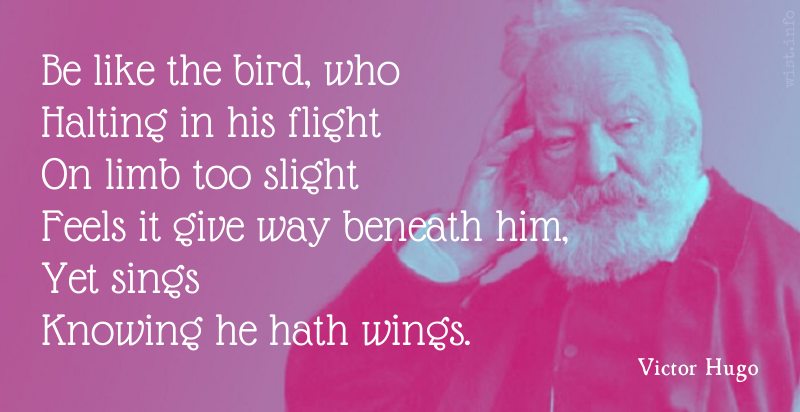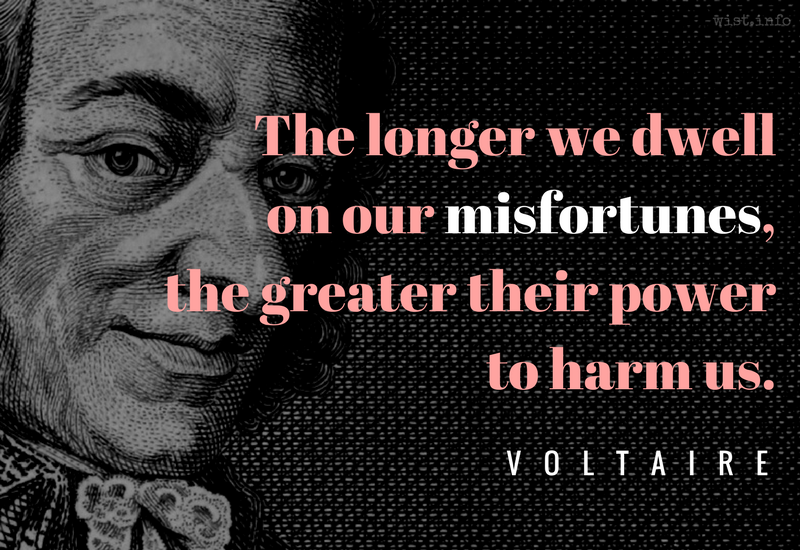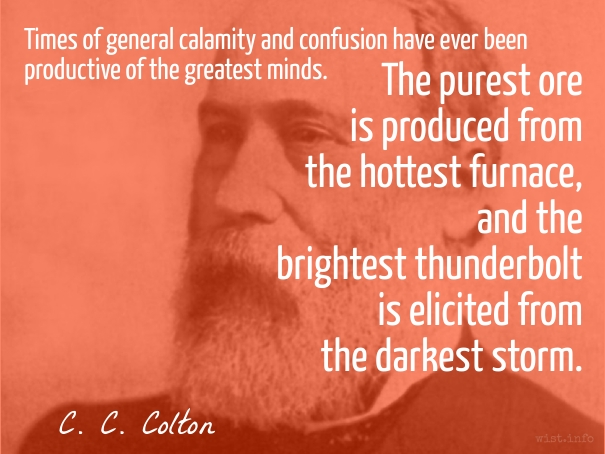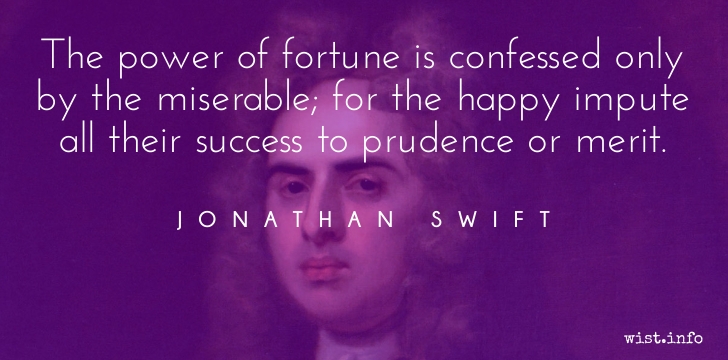There are such things as to speak well, to speak easily, to speak correctly, and to speak seasonably. We offend against the last way of speaking if we mention a sumptuous entertainment we have just been present at before people who have not had enough to eat; if we boast of our good health before invalids; if we talk of our riches, our income, and our fine furniture to a man who has not so much as an income or a dwelling; in a word, if we speak of our prosperity before people who are wretched; such a conversation is too much for them, and the comparison which they then make between their condition and ours is very painful.
[Il y a parler bien, parler aisément, parler juste, parler à propos. C’est pécher contre ce dernier genre que de s’étendre sur un repas magnifique que l’on vient de faire, devant des gens qui sont réduits à épargner leur pain; de dire merveilles de sa santé devant des infirmes; d’entretenir de ses richesses, de ses revenus et de ses ameublements un homme qui n’a ni rentes ni domicile; en un mot, de parler de son bonheur devant des misérables: cette conversation est trop forte pour eux, et la comparaison qu’ils font alors de leur état au vôtre est odieuse.]
Jean de La Bruyère (1645-1696) French essayist, moralist
The Characters [Les Caractères], ch. 5 “Of Society and Conversation [De la Société et de la Conversation],” § 23 (5.23) (1688) [tr. Van Laun (1885)]
(Source)
(Source (French)). Alternate translations:
Some men talk well, easily, justly, and to the purpose: those offend in the last kind, who speak of the Banquets they are to be at, before such as are reduc'd to spare their Bread; of sound Limbs, before the Infirm; of Demesnes and Revenues, before the Poor and Needy; of fine Houses and Furniture, before such as have neither Dwelling or Moveables: in a word, who speak of Prosperity, before the Miserable. This conversation is too strong for 'em, and the comparison you make between their condition and yours is odious.
[Bullord ed. (1696)]
There is speaking well, speaking easily, speaking justly, and speaking seasonably: 'Tis transgressing the last rule, to speak ofthe sumptuous Entertainments you have made, before such as are reduc'd to want of Bread; of a healthy Constitution of Body, before the Infirm; of Demesnes, Revenues and Furniture, before a Man who has neither Dwelling, Rents, nor Movables; in a word, to speak of your Prosperity before the Miserable: this Conversation is too strong from them, and the Comparison they make between their Condition and yours is odious.
[Curll ed. (1713)]
There is speaking well, speaking easily, speaking justly, and speaking seasonably: It is offending against the last, to speak of Entertainments before the Indigent; of sound Limbs and Health before the Infirm; of Houses and Lands before one who has not so much as a Dwelling; in a Word, to speak of your Prosperity before the Miserable; this Conversation is cruel, and the Comparison which naturally rises in them betwixt their Condition and yours is excruciating.
[Browne ed. (1752)]
There is a difference between speaking well, speaking easily, speaking with judgement and speaking opportunely. We fail in this last respect when we enlarge upon the splendid meal we have just enjoyed in front of people who have to be thrifty of their bread; or boast of our health in the presence of invalids; or talk about our wealth, our fortune and property to a man who has neither home nor income; in a word, when we speak of our happiness in front of those who are wretched; such conversation is too painful for them, and the comparison they are bound to make between your state and their own is intolerable.
[tr. Stewart (1970)]
Quotations about:
misfortune
Note not all quotations have been tagged, so Search may find additional quotes on this topic.
From a cross Neighbour, and a sullen Wife,
A pointless Needle, and a broken Knife;
From Suretyship, and from an empty Purse,
A Smoaky Chimney and a jolting Horse;
From a dull Razor, and an aking Head,
From a bad Conscience and a buggy Bed;
A Blow upon the Elbow and the Knee,
From each of these, Good L—d deliver me.Benjamin Franklin (1706-1790) American statesman, scientist, philosopher, aphorist
Poor Richard (1734 ed.)
(Source)
FOOL: He that has and a little tiny wit,
With hey, ho, the wind and the rain,
Must make content with his fortunes fit,
Though the rain it raineth every day.William Shakespeare (1564-1616) English dramatist and poet
King Lear, Act 3, sc. 2, l. 81ff (3.2.81-84) (1606)
(Source)
It’s no use crying over spilt evils. It’s better to mop them up laughing.
Eleanor Farjeon (1881-1965) English author
Gypsy and Ginger, “Gypsy and Ginger Take Things Seriously” [Gypsy] (1920)
(Source)
I tell you this, and I tell you plain:
What you have done, you will do again;
You will bite your tongue, careful or not,
Upon the already-bitten spot.Mignon McLaughlin (1913-1983) American journalist and author
The Neurotic’s Notebook, ch. 5 (1963)
(Source)
The number of times the toast falls butter side down increases in direct proportion to the value of the rug or the price of the butter.
Marcelene Cox (1900-1998) American writer, columnist, aphorist
“Ask Any Woman” column, Ladies’ Home Journal (1951-09)
(Source)
A variant on the Butter-Side-Down Law.
Yield not to evils, but the bolder thou
Persist, defiant of misfortune’s frown,
And take the path thy Destinies allow.[Tu ne cede malis, sed contra audentior ito
Quam tua te fortuna sinet.]Virgil (70-19 BC) Roman poet [b. Publius Vergilius Maro; also Vergil]
The Aeneid [Ænē̆is], Book 6, l. 95ff (6.95-96) [The Sybil] (29-19 BC) [tr. Taylor (1907), st. 15, ll. 12]
(Source)
Stoic maxim. There is argument as to whether it should be quam or qua, leading to some variations in translating the second half of the quotation.
(Source (Latin)). Alternate translations:
Yet dangers fear not, but on bolder goe,
What course thy fortune grants
[tr. Ogilby (1649)]
But thou, secure of soul, unbent with woes,
The more thy fortune frowns, the more oppose.
[tr. Dryden (1697)]
Yield not under your sufferings, but encounter them with greater boldness than your fortune shall permit.
[tr. Davidson/Buckley (1854)]
Yet still despond not, but proceed
Along the path where Fate may lead.
[tr. Conington (1866)]
Yet yield not thou, but go more boldly on,
Where Fortune leads, till victory be won.
[tr. Cranch (1872), ll. 121-122]
Yield not thou to distresses, but all the bolder go forth to meet them, as thy fortune shall allow thee way.
[tr. Mackail (1885)]
But thou, yield not to any ill, but set thy face, and wend
The bolder where thy fortune leads.
[tr. Morris (1900)]
Oh! yield not to thy woe, but front it ever,
And follow boldly whither Fortune calls.
[tr. Williams (1910)]
Yield not thou to ills, but go forth to face them more boldly than thy Fortune shall allow thee!
[tr. Fairclough (1916)]
Do not yield to evil,
Attack, attack, more boldly even than fortune
Seems to permit.
[tr. Humphries (1951)]
But never give way to those evils: face them all the more boldly,
Using what methods your luck allows you.
[tr. Day-Lewis (1952)]
Do not relent before distress, but be
far bolder than your fortune would permit.
[tr. Mandelbaum (1971), ll. 132-33]
Never shrink from blows.
Boldly, more boldly where your luck allows,
Go forward, face them.
[tr. Fitzgerald (1981), ll. 143-45]
You must not give way to these adversities but must face them all the more boldly wherever your fortune allows it.
[tr. West (1990)]
Do not give way to misfortunes, meet them more bravely,
as your destiny allows.
[tr. Kline (2002)]
Do not yield, but oppose your troubles
All the more boldly, as far as your fate
And fortune allow.
[tr. Lombardo (2005)]
But never bow to suffering, go and face it,
all the bolder, wherever Fortune clears the way.
[tr. Fagles (2006), ll. 113-14]
Don’t yield to evils, but go boldly forward
Where your fortune bids you.
[tr. @sentantiq (2018)]
Don't give up at these misfortunes. Be as brave as Fortune lets you.
[tr. Bartsch (2021)]
I ne’er insulted the calamities
Of those who were unfortunate, because
I fear’d that I myself might also suffer.[μή μοι προτείνων ἐλπίδ᾽ ἐξάγου δάκρυ. γένοιτο τἂν πόλλ’ ὧν δόκησις οὐκ ἔνι.]
Euripides (485?-406? BC) Greek tragic dramatist
Andromeda [Ἀνδρομέδα], Frag. 130 (TGF) (412 BC) [tr. Wodhull (1809)]
(Source)
(Source (Greek)). Alternate translation:
I never treated the troubles of the unfortunate insultingly,
through fear of suffering them myself.
[tr. Gibert (2004)]
Every man is bound to bear his own misfortunes rather than to get quit of them by wronging his neighbour.
[Suum cuique incommodum ferendum est potius quam de alterius commodis detrahendum.]
Marcus Tullius Cicero (106-43 BC) Roman orator, statesman, philosopher
De Officiis [On Duties; On Moral Duty; The Offices], Book 3, ch. 5 (3.5) / sec. 30 (44 BC) [tr. Cockman (1699)]
(Source)
(Source (Latin)). Alternate translation:
Every man ought to bear his own evils, rather than wrong another, by stripping him of his comforts.
[tr. McCartney (1798)]
It is rather the duty of each to bear his own misfortune, than wrongfully to take from the comforts of others.
[tr. Edmonds (1865)]
Each man must bear his own privations rather than take what belongs to another.
[tr. Peabody (1883)]
A man should bear his own misfortune rather than trench upon the good fortune of another.
[tr. Gardiner (1899)]
It is the duty of each man to bear his own discomforts, rather than diminish the comforts of his neighbor.
[ed. Harbottle (1906)]
Each one must bear his own burden of distress rather than rob a neighbour of his rights.
[tr. Miller (1913)]
Each man should endure his own suffering rather than reduce the benefits of another person.
[tr. Edinger (1974)]
“How did you go bankrupt?” Bill asked.
“Two ways,” Mike said. “Gradually and then suddenly.”
And, oh! whate’er Heaven destined to betide,
Let neither flattery soothe, nor pity hide.
Prepared I stand: he was but born to try
The lot of man; to suffer, and to die.[πέρι γάρ μιν ὀιζυρὸν τέκε μήτηρ.
μηδέ τί μ᾽ αἰδόμενος μειλίσσεο μηδ᾽ ἐλεαίρων,
ἀλλ᾽ εὖ μοι κατάλεξον ὃπως ἤντησας ὀπωπῆς.]Homer (fl. 7th-8th C. BC) Greek author
The Odyssey [Ὀδύσσεια], Book 3, l. 96ff (3.96) (c. 700 BC) [tr. Pope (1725), l. 114ff]
(Source)
Telemachus seeking to learn from Nestor of the fate of his father, Odysseus. Telemachus later repeats these words in seeking news of his father from Menelaus (4.326). (Source (Greek)). Alternate translations:
[T]he unhappy wanderer,
To too much sorrow whom his mother bore.
You then by all your bounties I implore,
[...] that in nought applied
To my respect or pity you will glose,
But uncloth’d truth to my desires disclose
[tr. Chapman (1616)]
[B]orn to calamity.
Let no respect, or pity mitigate
Your story, howsoever sad it be.
Nothing but naked truth to me relate.
[tr. Hobbes (1675), l. 85ff]
For my father at his birth
Was, sure, predestin’d to no common woes.
Neither through pity, or o’erstrain’d respect
Flatter me, but explicit all relate
Which thou hast witness’d.
[tr. Cowper (1792), l. 120ff]
How hath his mother to exceeding teen
borne him! Let no kind thought thy tidings screen;
Paint not the tale through pity.
[tr. Worsley (1861), st. 12]
For sure a woeful wight his mother bore him!
Extenuate naught for shame or pity's sake,
But tell me all, as thou hast chanced to see!
[tr. Bigge-Wither (1869), l. 95ff]
His mother bare him to exceeding sorrow. And speak me no soft words in ruth or pity, but tell me plainly what sight thou didst get of him.
[tr. Butcher/Lang (1879)]
This man, his mother bore him to most exceeding woe --
But have no respect of my sorrow nor be soft and soothing now,
But tell all out unto me, in what wise the man thou hast seen.
[tr. Morris (1887), l. 95ff]
To exceeding grief his mother bore him. Use no mild word, no yield to pity, from regard for me, but tell me fully all you chanced to see.
[tr. Palmer (1891)]
He was a man born to trouble. Do not soften things out of any pity for me, but tell me in all plainness exactly what you saw.
[tr. Butler (1898)]
For beyond all men did his mother bear him to sorrow. And do thou nowise out of ruth or pity for me speak soothing words, but tell me truly how thou didst come to behold him.
[tr. Murray (1919)]
Even from his mother's womb, calamity had marked him for her own. Do not in pity convey to me smooth things, things gentler than the truth: blurt out, rather, all that met your sight.
[tr. Lawrence (1932)]
For if ever a man was born for misery, it was he. Do not soften your account out of pity or concern for my feelings, but faithfully describe the scene that met your eyes.
[tr. Rieu (1946)]
The man was born for trouble. Spare me no part for kindness' sake; be harsh; but put the scene before me as you saw it.
[tr. Fitzgerald (1961)]
His mother bore this man to be wretched. Do not soften it because you pity me and are sorry for me, but fairly tell me all that your eyes have witnessed.
[tr. Lattimore (1965)]
She who gave birth to him gave birth to grief. You need not sweeten anything for me. Forget discretion, set aside your pity: tell me completely -- all you chanced to see.
[tr. Mandelbaum (1990)]
More than all other men, that man was born for pain.
Don't soften a thing, from pity, respect for me --
tell me, clearly, all your eyes have witnessed.
[tr. Fagles (1996)]
He was born to sorrow.
More than any man on earth. And do not,
Out of pity, spare me the truth, but tell me
Whatever you have seen, whatever you know.
[tr. Lombardo (2000), l. 104ff]
For his mother indeed bore him to be woeful. Spare me nothing, extenuate nothing, nor show any pity; tell me all to the end, however it came to your notice.
[tr. Merrill (2002)]
For if ever a man was born to suffer it was he. Do not soften your account out of pity or concern for my feelings, but faithfully describe the scene that met your eyes.
[tr. D C H Rieu (2002)]
More than any other man his mother bore him for wretchedness. Do not let respect or pity for me soften your words, but tell me exactly how you chanced to see him.
[tr. Verity (2016)]
He was surely born to suffer in extraordinary ways. Please do not try to sweeten bitter news from pity; tell me truly if you saw him, and how he was.
[tr. Wilson (2017)]
To unmatched sorrow his mother bore him! And don't, from concern or pity, speak false comfort to me, but tell me exactly what you may have witnessed!
[tr. Green (2018)]
For his mother bore him
to go through trouble more than other men.
Do not pity me or, from compassion,
just offer me kind words of consolation,
but tell me truly how you chanced to see him.
[tr. Johnston (2019), l. 119ff]
A cloudy day, or a little sunshine, have as great an influence on the constitutions as the most real blessings or misfortunes.
Joseph Addison (1672-1719) English essayist, poet, statesman
The Spectator #162 (5 Sep 1711)
(Source)
To ruminate upon evils, to make critical notes upon injuries, and be too acute in their apprehensions, is to add unto our own Tortures, to feather the Arrows of our Enemies, to lash our selves with the Scorpions of our Foes, and to resolve to sleep no more.
Thomas Browne (1605-1682) English physician and author
Christian Morals, Part 3, sec. 12 (1716)
(Source)
For he says that evils are neither diminished by time nor lightened by being premeditated; that meditation on evil to come, or, it may be, on that which will never come, is foolish; that every evil is sufficiently annoying when it comes; that to him who has always thought that something adverse may happen to him that very thought is a perpetual evil; that if the expected evil should not happen, he would have incurred voluntary misery in vain; that thus one would be always in distress, either in suffering evil or in thinking of it.
[Nam neque vetustate minui mala nec fieri praemeditata leviora, stultamque etiam esse meditationem futuri mali aut fortasse ne futuri quidem: satis esse odiosum malum omne, cum venisset; qui autem semper cogitavisset accidere posse aliquid adversi, ei fieri illud sempiternum malum; si vero ne futurum quidem sit, frustra suscipi miseriam voluntariam; ita semper angi aut accipiendo aut cogitando malo.]
Marcus Tullius Cicero (106-43 BC) Roman orator, statesman, philosopher
Tusculan Disputations [Tusculanae Disputationes], Book 3, ch. 15 (3.15) / sec. 32 (45 BC) [tr. Peabody (1886)]
(Source)
Discussing the teachings of Epicurus (fr. U444). Source (Latin). Alternate translations:
For that neither are Evils abated by long time, nor yet alleviated by foresight of them; and that the poring on Evils not yet come, and perhaps that never will come, is foolish. For that all Evil is Vexation enough, when it is come; but he that is always thinking that some Adversity may possibly befall him, to him it becometh an everlasting Evil; but if it shall never actually come upon him, a voluntary Disquiet is taken up on false grounds; so the mind is always vex'd, either with enduring, or expecting Evil.
[tr. Wase (1643)]
Evils are not the less by reason of their continuance, nor the oighter for having been foreseen; and it is folly to ruminate on evils to come, or that, perhaps, may never come; every evil is disagreeable enough when it doth come: but he who is constantly considering that some evil may befall him, charges himself with a perpetual evil, for should such eve never light on him, he voluntarily takes to himself unnecessary misery, so that he is under constant uneasiness, whether he meets any evil or only thinks of it.
[tr. Main (1824)]
For evil ls not diminished by time, nor alleviated by premeditation: that it is folly itself to brood upon evil that is future, or indeed, perhaps, is not to be at all: that evil is hateful enough when it comes: that, to the man, who is always musing upon that which is to come, his meditation itself becomes an eternal evil; and, should it prove that his apprehensions have been groundless, he burdens himself with a voluntary misery; and thus, between the encounter and contemplation of evil, he is always in trouble.
[tr. Otis (1839)]
Evils are not the less by reason of their continuance, nor the lighter for having been foreseen; and it is folly to ruminate on evils to come, or such as, perhaps, never may come; every evil is disagreeable enough when it does come; but he who is constantly considering that some evil may befall him, is loading himself with a perpetual evil, and even should such evil never light on him, he voluntarily takes upon himself unnecessary misery, so that he is under constant uneasiness, whether he actually suffers any evil, or only thinks of it.
[tr. Yonge (1853)]
Evils are not diminished by the passage of time, nor made easier by pre-rehearsal. In fact it is foolish to rehearse misfortunes which have not yet happened and which may not happen at all. Each of our misfortunes is distasteful enough, he says, when it is already here: those who have constantly been thinking about what disagreeable things are on the way simply make their evils perpetual. And those things may not happen at all, in which case all their voluntary misery goes for nothing. The result is that they are always in anxiety, either from the evils they undergo or from those they anticipate.
[tr. Graver (2002)]
A thief can rifle any till,
A fire with ash your home can fill,
A creditor calls in your debt.
Bad harvest does your farm upset,
An impish mistress robs your dwelling,
Storm shatters ships with water swelling.
But gifts to friends your friendships save.
You keep thus always what you gave.[Callidus effracta nummos fur auferet arca,
Prosternet patrios impia flamma lares:
Debitor usuram pariter sortemque negabit,
Non reddet sterilis semina iacta seges:
Dispensatorem fallax spoliabit amica,
Mercibus extructas obruet unda rates.
Extra fortunam est, quidquid donatur amicis:
Quas dederis, solas semper habebis opes.]Martial (AD c.39-c.103) Spanish Roman poet, satirist, epigrammatist [Marcus Valerius Martialis]
Epigrams [Epigrammata], Book 5, epigram 42 (5.42) (AD 90) [tr. Wills (2007)]
(Source)
(Source(Latin)). Alternate translations:
The crafty thefe from battered chest,
doth filch thy coine awaie:
The debter nor the interest,
nor principall will pay.
The fearefull flame destroies the goods,
and letteth nought remaine:
The barren ground for seede recevd,
restoreth naught again.
The subtle harlot naked strips
her lover to the skin:
If thou commit thy self to seas,
great danger art thou in.
Not that thou gevest to thy frend,
can fortune take away:
That onely that thou givst thy friend,
thou shalt posses for ay.
[tr. Kendall (1577)]
Thieves may thy Coffers breake, steale coyne or plate;
Thy house a sudden fire may ruinate.
Debtors may Use, and Principall deny,
And dead thy seedes in barren Grounds may lye:
Thy Steward may be cheated by a Whore;
Thy Merchandise the Ocean may devour.
But what thou giv'st thy friends, from chance is free.
Thy gifts alone shall thine for ever be.
[tr. May (1629)]
Some felon-hand may steal thy gold away;
Or flames destructive on thy mansion prey.
The fraudful debtor may thy loan deny;
Or blasted fields no more their fruits supply.
The am'rous steward to adorn his dear,
With spoils may deck her from thy plunder'd year.
Thy freighted vessels, ere the port they gain,
O'erwhelm'd by storms may sink beneath the main:
But what thou giv'st a friend for friendship's sake,
Is the sole wealth which fortune n'er can take.
[tr. Melmoth (c. 1750)]
Thieves may break locks, and with your cash retire;
Your ancient seat may be consumed by fire;
Debtors refuse to pay you what they owe;
Or your ungrateful field the seed you sow;
You may be plundered by a jilting whore;
Your ships may sink at sea with all their store:
Who gives to friends, so much from Fate secures;
That is the only wealth for ever yours.
[tr. Hay (1755), ep. 43]
The thief shall burst thy box, and slyly go:
The impious flame shall lay thy Lares low.
Thy dettor shall deny both use and sum:
Thy seed deposited may never come.
A faithless female shall they steward spoil:
They ships are swallow'd, while thy billow boil.
Whate'er is bountied, quit vain fortune's road:
Thine is alone the wealth thou has bestow'd.
[tr. Elphinston (1782), Book 5, ep. 82]
A crafty thief may purloin money from a chest;
an impious flame may destroy paternal Lares;
a debtor may deny both principal and interest;
land may not yield crops in return for the seed scattered upon it;
frauds may be practices on a steward entrusted with your household purse;
the sea may overwhelm ships laden with merchandise.
Whatever is given to friends is beyond the reach of Fortune;
the wealth you have bestowed is the only wealth you can keep.
[tr. Amos (1858), ch. 3, ep. 77]
A cunning thief may burst open your coffers, and steal your coin;
an impious fire may lay waste your ancestral home;
your debtor may refuse you both principal and interest;
your corn-field may prove barren, and not repay the seed you have scattered upon it;
a crafty mistress may rob your steward;
the waves may engulf your ships laden with merchandise.
But what is bestowed on your friends is beyond the reach of fortune;
the riches you give away are the only riches you will possess for ever.
[tr. Bohn's Classical (1859)]
A present to a friend's beyond the reach of fortune:
That wealth alone you always will possess
Which you have given away.
[ed. Harbottle (1897)]
A cunning thief will break your money-box and carry off your coin,
cruel fire will lay low your ancestral home;
your debtor will repudiate interest alike and principal,
your sterile crop will not return you the seed you have sown;
a false mistress will despoil your treasurer,
the wave will overwhelm your ships stored with merchandise.
Beyond Fortune's power is any gift made to your friends;
only wealth bestowed will you possess always.
[tr. Ker (1919)]
Some thief may steal your wealth away,
Although by massive walls surrounded;
Or ruthless fire in ashes lay
The ancient home your fathers founded;
A debtor may withhold your dues,
Deny perhaps a debt is owing,
Or sullen ploughlands may refuse
To yield a harvest to your sowing.
A cunning trollop of the town
May make your agent rob his master,
Or waters of the ocean drown
Your goods and ship in one disaster.
But give to friends whate'er you may,
'Tis safe from fortune's worst endeavor:
The riches that you give away,
These only shall be yours for ever.
[tr. Pott & Wright (1921)]
Some cunning burglar will abstract your plate,
A godless fire your roof will devastate,
A debtor steal both interest and loan,
A barren field will turn your seed to stone.
A wily wench will strip your steward bare,
The greedy sea engulf your galleon's ware.
Give to a friend and fortune is checkmated;
Such wealth will ever as your own be rated.
[tr. Francis & Tatum (1924), #247]
A cunning thief may rob your money-chest,
And cruel fire lay low an ancient home;
Debtors may keep both loan and interest;
Good seed may fruitless rot in barren loam.
A guileful mistress may your agent cheat,
And waves engulf your laden argosies;
But boons to friends can fortune's slings defeat:
The wealth you give away will never cease.
[tr. Duff (1929)]
A cunning thief will break open your coffer and carry off your money, ruthless fire will lay low your family horne, your debtor will repudiate interest and principal alike, your barren fields will not return the scattered seed, a tricky mistress will rob your steward, the wave ,will overwhelm your ships piled high with merchandise: hut whatever is given to friends is beyond the grasp of Fortune. Only the wealth you give away will always be yours.
[tr. Shackleton Bailey (1993)]
Deft thieves can break your locks and carry off your savings,
fire consume your home,
debtors default on principal and interest,
failed crops return not even the seed you'd sown,
cheating women run up your charge accounts,
storm overwhelm ships freighted with all your goods.
Fortune can't take away what you give your friends:
that wealth stays yours forever.
[tr. Powell (c. 2000)]
The only wealth that's yours forever
is the wealth you give away.
[tr. Kennelly (2008), "Forever"]
Sly thieves will smash your coffer and steal your cash;
impious flames will wreck your family home;
your debtor won't repay your loan or interest;
your barren fields will yield less than you've sown;
a crafty mistress will despoil your steward;
a wave will swamp your ships piled high with stores.
But what you give to friends is safe from Fortune:
only the wealth you give away is yours.
[tr. McLean (2014)]
Savings -- the cunning thief will crack your safe and steal them;
ancestral home -- the fires don't care, they'll trash it;
the guy who owes you money -- won't pay the interest, won't pay at all.
Your field -- it's barren, sow seed and you'll get no return;
your girlfriend -- she'll con your accountant and leave you penniless;
your shipping line -- the waves will swamp your stacks of cargo.
But what you give to friends is out of fortune's reach.
The wealth you give away is the only wealth you'll never lose.
[tr. Nisbet (2015)]
Pity is aroused by unmerited misfortune, fear by the misfortune of a man like ourselves.
[ἔλεος μὲν περὶ τὸν ἀνάξιον, φόβος δὲ περὶ τὸν ὅμοιον]
Aristotle (384-322 BC) Greek philosopher
Poetics [Περὶ ποιητικῆς, De Poetica], ch. 13 / 1453a (c. 335 BC) [tr. Butcher (1895)]
(Source)
On the essential elements of tragedy. Original Greek. Alternate translations:
- "Pity is occasioned by undeserved misfortune, and fear by that of one like ourselves." [tr. Bywater (1909)]
- "Pity is concerned with unmerited ill-fortune, fear with what happens to one's like." [tr. Margoliouth (1911)]
- "Pity for the undeserved misfortune, fear for the man like ourselves." [tr. Fyfe (1932)]
- "We pity those who suffer undeservedly, and feel fear for people who are like ourselves." [tr. Janko (1987)]
- "The one [pity] is to do with the man brought to disaster undeservedly, the other [terror] is to do with [what happens to] men like us." [tr. Whalley (1997)]
- "One of these sentiments, namely pity, has to do with undeserved misfortune, and the other, namely fear, has to do with someone who is like ourselves." [tr. Sachs (2006)]
My word, how mortals take the gods to task!
All their afflictions come from us, we hear.
And what of their own failings? Greed and folly
double the suffering in the lot of man.[ὢ πόποι, οἷον δή νυ θεοὺς βροτοὶ αἰτιόωνται.
ἐξ ἡμέων γάρ φασι κάκ’ ἔμμεναι· οἱ δὲ καὶ αὐτοὶ
σφῇσιν ἀτασθαλίῃσιν ὑπὲρ μόρον ἄλγε’ ἔχουσιν.]Homer (fl. 7th-8th C. BC) Greek author
The Odyssey [Ὀδύσσεια], Book 1, l. 32ff (1.32) [Zeus] (c. 700 BC) [tr. Fitzgerald (1961)]
(Source)
Original Greek. Alternate translations:
O how falsely men
Accuse us Gods as authors of their ill!
When, by the bane their own bad lives instill,
They suffer all the mis’ries of their states,
Past our inflictions, and beyond their fates.
[tr. Chapman (1616)]
Ha! how dare mortals tax the Gods, and say,
Their harms do all proceed from our decree,
And by our setting; when by their crimes they
Against our wills make their own destiny?
[tr. Hobbes (1675), l. 37ff]
Perverse mankind! whose wills, created free,
Charge all their woes on absolute degree;
All to the dooming gods their guilt translate,
And follies are miscall'd the crimes of fate.
[tr. Pope (1725)]
Alas! how prone are human-kind to blame
The Pow’rs of Heav’n! From us, they say, proceed
The ills which they endure, yet more than Fate
Herself inflicts, by their own crimes incur.
[tr. Cowper (1792), l. 41ff]
Mortals, ye Powers, upbraid us with their voice,
And brand us for the fount of all their ill,
Who, of their own acts, not of fate but choice,
Heap to themselves much toil and sorrow still.
[tr. Worsley (1861), st. 6]
Why! what reproach,
Ye gods! do mortals cast on deities!
To us all their calamities they trace,
While they, themselves, through their own senseless acts,
Feel pangs their destiny had ne'er decreed.
[tr. Musgrave (1869)]
Oh heavens! how mortals now to blame the gods!
From us they say spring ills! but they themselves
By their own folly bring unfated woes.
[tr. Bigge-Wither (1869)]
Lo you now, how vainly mortal men do blame the gods! For of us they say comes evil, whereas they even of themselves, through the blindness of their own hearts, have sorrows beyond that which is ordained.
[tr. Butcher/Lang (1879)]
Lo, how men blame the gods! From us, they say, spring troubles. But through their own perversity and more than is their due they meet with sorrow.
[tr. Palmer (1891)]
See now, how men lay blame upon us gods for what is after all nothing but their own folly.
[tr. Butler (1898)]
Oh my, how mortals hold us gods responsible! For they say that their misfortunes come from us. But they get their sufferings, beyond what is fated, by way of their own acts of recklessness.
[tr. Butler (1898), rev. Kim/McCray/Nagy/Power (2018)]
Look you now, how ready mortals are to blame the gods. It is from us, they say, that evils come, but they even of themselves, through their own blind folly, have sorrows beyond that which is ordained.
[tr. Murray (1919)]
It vexes me to see how mean are these creatures of a day towards us Gods, when they charge against us the evils (far beyond our worst dooming) which their own exceeding wantonness has heaped upon themselves.
[tr. Lawrence (1932)]
What a lamentable thing it is that men should blame the gods and regard us as the source of their troubles, when it is their own wickedness that brings them sufferings worse than any which Destiny allots them.
[tr. Rieu (1946)]
Oh for shame, how the mortals put the blame upon us
gods, for they say evils come from us, but it is they, rather,
who by their own recklessness win sorrow beyond what is given.
[tr. Lattimore (1965)]
Men are so quick to blame the gods: they say
that we devise their misery. But they
themselves -- in their depravity -- design
grief greater than the griefs that fate assigns.
[tr. Mandelbaum (1990)]
Ah how shameless -- the way these mortals blame the gods.
From us alone, they say, come all their miseries, yes,
but they themselves, with their own reckless ways,
compound their pains beyond their proper share.
[tr. Fagles (1996)]
Mortals! They are always blaming the gods
For their troubles, when their own witlessness
Causes them more than they were destined for!
[tr. Lombardo (2000), l. 37ff]
Strange to behold, what blame these mortals can bring against godhead! For their ills, they assert, are from us, when they themselves by their mad recklessness have pain far past what is fated.
[tr. Merrill (2002)]
What a lamentable thing it is that men should blame the gods and regard us as the source of their troubles, when it is their own transgressions which bring them suffering that was not their destiny.
[tr. DCH Rieu (2002)]
This is not good! See how mortals find fault with us gods!
They say it is from us that all evil things come, yet it is by their
own recklessness that they suffer hardship beyond their destiny.
[tr. Verity (2016)]
This is absurd,
that mortals blame the gods! They say we cause
their suffering, but they themselves increase it
by folly.
[tr. Wilson (2017)]
My oh my, the way mortals will fasten blame on the gods!
From us, they say, evils come, yet they themselves
through their own blind recklessness have ills beyond
their fated lot.
[tr. Green (2018)]
It’s disgraceful how humans blame the gods.
They say their tribulations come from us,
when they themselves, through their own foolishness,
bring hardships which are not decreed by Fate.
[tr. Johnston (2019), l. 41ff]
Perhaps if we saw what was ahead of us, and glimpsed the crimes, follies, and misfortunes that would befall us later on, we would all stay in our mother’s wombs, and there would be nobody in the world but a great number of very fat, very irritated women.
In all your actions, words, and thoughts, be aware that it is possible that you may depart from life at any time. But leaving the human race is nothing to be afraid of, if the gods exist; they would not involve you in anything bad. And if they do not exist or have no concern for human affairs, why should I live in a universe empty of gods and empty of providence? But the gods do exist and have concern for human affairs and have placed it wholly in the power of human beings never to meet what is truly bad.
[Ὡς ἤδη δυνατοῦ ὄντος ἐξιέναι τοῦ βίου, οὕτως ἕκαστα ποιεῖν καὶ λέγειν καὶ διανοεῖσθαι. τὸ δὲ ἐξ ἀνθρώπων ἀπελθεῖν, εἰ μὲν θεοὶ εἰσίν, οὐδὲν δεινόν: κακῷ γάρ σε οὐκ ἂν περιβάλοιεν: εἰ δὲ ἤτοι οὐκ εἰσὶν ἢ οὐ μέλει αὐτοῖς τῶν ἀνθρωπείων, τί μοι ζῆν ἐν κόσμῳ κενῷ θεῶν ἢ προνοίας κενῷ; ἀλλὰ καὶ εἰσὶ καὶ μέλει αὐτοῖς τῶν ἀνθρωπείων καὶ τοῖς μὲν κατ̓ ἀλήθειαν κακοῖς ἵνα μὴ περιπίπτῃ ὁ ἄνθρωπος, ἐπ̓ αὐτῷ τὸ πᾶν ἔθεντο.]
Marcus Aurelius (AD 121-180) Roman emperor (161-180), Stoic philosopher
Meditations, Book 2, #11 [tr. Gill (2014)]
(Source)
Original Greek. Alternate translations:
Whatsoever thou dost affect, whatsoever thou dost project, so do, and so project all, as one who, for aught thou knowest, may at this very present depart out of this life. And as for death, if there be any gods, it is no grievous thing to leave the society of men. The gods will do thee no hurt, thou mayest be sure. But if it be so that there be no gods, or that they take no care of the world, why should I desire to live in a world void of gods, and of all divine providence? But gods there be certainly, and they take care for the world; and as for those things which be truly evil, as vice and. wickedness, such things they have put in a man's own power, that he might avoid them if he would.
[tr. Casaubon (1634), #8]
Manage all your Actions and Thoughts in such a Manner as if you were just going to step into the Grave. And what great matter is the Business of Dying; if the Gods are in Being you can suffer nothing, for they'll do you no Harm, and if they are not, or take no Care of us Mortals, why then I must tell you, that a World without either Gods, or Providence is not worth a Man's while to live in. But there's no need of this Supposition; The Being of the Gods, and their Concern in Human Affairs is beyond Dispute. And as an Instance of this, They have put it in his Power not to fall into any Calamity properly so called.
[tr. Collier (1701)]
Since it is possible that thou mayest depart from life this very moment, regulate every act and thought accordingly. But to go away from among men, if there are gods, is not a thing to be afraid of, for the gods will not involve thee in evil; but if indeed they do not exist, or if they have no concern about human affairs, what is it to me to live in a universe devoid of gods or devoid of providence? But in truth they do exist, and they do care for human things, and they have put all the means in man's power to enable him not to fall into real evils.
[tr. Long (1873 ed.)]
Manage all your actions, words, and thoughts accordingly , since you may at any moment quit life. And what great matter is the business of dying? If the gods are in being, you can suffer nothing, for they will do you no har. And if they are not, or take no care of us mortals -- why, then a world without either gods or Providence is not worth a man's while ot live in. But, in truth, the being of the gods, and their concern in human affairs, is beyond dispute. And they have put it entirely in a man's power not to fall into any calamity properly so-called.
[tr. Zimmern (1887)]
Whatever you do or say or think, it is in your power, remember, to take leave of life. In departing from this world, if indeed there are gods, there is nothing to be afraid of; for gods will not let you fall into evil. But if there are no gods, or if they do not concern themsleves with men, why live on in a world devoid of gods, or devoid of providence? But there do exist gods, who do concern themselves with men. And they have put it wholly in the power of man not to fall into any true evil.
[tr. Rendall (1898 ed.)]
Let thine every deed and word and thought be those of a man who can depart from life this moment.[16] But to go away from among men, if there are Gods, is nothing dreadful ; for they would not involve thee in evil. But if indeed there are no Gods, or if they do not concern themselves with the affairs of men, what boots it for me to live in a Universe where there are no Gods, where Providence is not? Nay, but there are Gods, and they do concern themselves with human things;[17] and they have put it wholly in man's power not to fall into evils that are truly such.
[tr. Haines (1916)]
In the conviction that it is possible you may depart from life at once, act and speak and think in every case accordingly. But to leave the company of men is nothing to fear, if gods exist; for they would not involve you in ill. If, however, they do not exist or if they take no care for man's affairs, why should I go on living in a world void of gods, or void of providence? But they do exist, and they do care for men's lives, and they have put it entirely in a man's power not to fall into real ills.
[tr. Farquharson (1944)]
In all you do or say or think, recollect that at any time the power of withdrawal from life is in your hands. If gods exist, you have nothing to fear in taking leave of mankind, for they will not let you come to harm. But if there are no gods, or if they have no concern with mortal affairs, what is life to me, in a world devoid of gods or devoid of Providence? Gods, however, do exist, and do concern themselves with the world of men. They have given us full power not to fall into any of the absolute evils.
[tr. Staniforth (1964)]
You could leave life right now. Let that determine what you do and say and think. If the gods exist, then to abandon human beings is not frightening; the gods would never subject you to harm. And if they don't exist, or don't care what happens to us, what would be the point of living in a world without gods or Providence? But they do exist, they do care what happens to us, and everything a person needs to avoid real harm they have placed within him.
[tr. Hays (2003)]
Do, say, and think each thing as if it is possible to die right now. To leave the discussion of human affairs, if there are gods, it is nothing terrible -- for they would not ensnare you in evil. If, moreover, there are no gods -- or if the realms of men are not their concern -- why would I live in a universe emptied of gods or their foresight? No, there are gods and they are concerned with the affairs of men. And they have completely arranged it that the human race many not fall into evils that are truly evil.
[tr. @sentantiq (2017)]
Wisdom is by far the greatest part of joy,
and reverence toward the gods must be safeguarded.
The mighty words of the proud are paid in full
with mighty blows of fate, and at long last
those blows will teach us wisdom.[πολλῷ τὸ φρονεῖν εὐδαιμονίας
πρῶτον ὑπάρχει. χρὴ δὲ τά γ᾽ εἰς θεοὺς
μηδὲν ἀσεπτεῖν. μεγάλοι δὲ λόγοι
μεγάλας πληγὰς τῶν ὑπεραύχων
ἀποτίσαντες
γήρᾳ τὸ φρονεῖν ἐδίδαξαν.]Sophocles (496-406 BC) Greek tragic playwright
Antigone, l. 1348ff [Chorus] (441 BC) [tr. Fagles (1982), l. 1466ff]
(Source)
Final lines of the play. Original Greek. Alternate translations:
Wisdom is first of the gifts of good fortune:
'Tis a duty, to be sure, the rites of the Gods
Duly to honor: but words without measure, the
Fruit of vain-glory, in woes without number their
Recompense finding,
Have lesson'd the agéd in wisdom.
[tr. Donaldson (1848)]
Of happiness the chiefest part
Is a wise heart:
And to defraud the gods in aught
With peril's fraught.
Swelling words of high-flown might
Mightily the gods do smite.
Chastisement for errors past
Wisdom brings to age at last.
[tr. Storr (1859)]
Wise conduct hath command of happiness
Before all else, and piety to Heaven
Must be preserved. High boastings of the proud
Bring sorrow to the height to punish pride: --
A lesson men shall learn when they are old.
[tr. Campbell (1873)]
Wisdom is provided as the chief part of happiness, and our dealings with the gods must be in no way unholy. The great words of arrogant men have to make repayment with great blows, and in old age teach wisdom.
[tr. Jebb (1891)]
Wisdom alone is man's true happiness.
We are not to dispute the will of heaven;
For ever are the boastings of the proud
By the just gods repaid, and man at last
Is taught to fear their anger and be wise.
[tr. Werner (1892)]
Wisdom is the supreme part of happiness; and reverence towards the gods must be inviolate. Great words of prideful men are ever punished with great blows, and, in old age, teach the chastened to be wise.
[tr. Jebb (1917)]
There is no happiness where there is no wisdom;
No wisdom but in submission to the gods.
Big words are always punished
And proud men in old age learn to be wise.
[tr. Fitts/Fitzgerald (1939), l. 1039ff]
Of happiness the crown
And chiefest part
Is wisdom, and to hold
The gods in awe.
This is the law
That, seeing the stricken heart
Of pride brought down,
We learn when we are old.
[tr. Watling (1947), Exodos, l. 1027ff]
Our happiness depends
on wisdom all the way.
The gods must have their due.
Great words by men of pride
bring greater blows upon them.
So wisdom comes to the old.
[tr. Wyckoff (1954)]
Of happiness, far the greatest part is wisdom,
and reverence towards the gods.
Proud words of arrogant man, in the end,
Meet punishment, great as his pride was great,
Till at last he is schooled in wisdom.
[tr. Kitto (1962)]
Wisdom is supreme for a blessed life,
And reference for the gods
Must never cease. Great words, sprung from arrogance.
Are punished by great blows.
So it is one learns, in old age, to be wise.
[tr. Woodruff (2001)]
By far is having sense the first part
of happiness. One must not act impiously toward
what pertains to gods. Big words
of boasting men,
paid for by big blows,
teach having sense in old age.
[tr. Tyrell/Bennett (2002)]
The most important thing in man’s happiness is good judgement and he must not treat with disdain the works of the gods.
The arrogant pay for their big proud words with great downfalls and it’s only then, in their old age that they gain wisdom!
[tr. Theodoridis (2004)]
The most important part of true success
is wisdom -- not to act impiously
towards the gods, for boasts of arrogant men
bring on great blows of punishment --
so in old age men can discover wisdom.
[tr. Johnston (2005)]
Knowledge truly is by far the most important part of happiness, but one must neglect nothing that the gods demand. Great words of the over-proud balanced by great falls taught us knowledge in our old age.
[tr. Thomas (2005)]
And bad luck reveals those who are not real friends, but just happen to be so because of utility.
[ἡ δ᾽ ἀτυχία δηλοῖ τοὺς μὴ ὄντως [20] ὄντας φίλους, ἀλλὰ διὰ τὸ χρήσιμον τυχόντας.]
Aristotle (384-322 BC) Greek philosopher
Eudemian Ethics [Ἠθικὰ Εὐδήμεια], Book 7, ch. 2 / 1238a.19-20 [tr. Reeve (2021)]
(Source)
(Source (Greek)). Alternate translations:
Misfortune shows those who are not really friends, but friends only for some accidental utility.
[tr. Solomon (1915)]
Misfortune shows those who are not friends really but only because of some casual utility.
[tr. Rackham (1981)]
But misfortune shows those who are friends not really but because of chance utility.
[tr. Simpson (2013)]
Life has this in common with prizefighting: if you’ve received a belly blow, it’s likely to be followed by a right to the jaw.
Carolyn Gold Heilbrun (1926-2003) American academic, feminist author, novelist [as Amanda Cross]
The James Joyce Murder, ch. 1 (1967) [as Amanda Cross]
(Source)
Necessity may well be called the mother of invention — but calamity is the test of integrity.
Samuel Richardson (1689-1761) English writer and printer
Clarissa, or, The History of a Young Lady, Letter 47 (1748)
(Source)
TRINCULO: Misery acquaints a man with strange bedfellows.
William Shakespeare (1564-1616) English dramatist and poet
Tempest, Act 3, sc. 2, l. 40 (3.2.40) (1611)
(Source)
People don’t ever seem to realize that doing what’s right’s no guarantee against misfortune.
William McFee (1881-1966) English writer
Casuals of the Sea, Book 2, ch 6 (1916)
(Source)
Sometimes paraphrased "Doing what's right is no guarantee against misfortune."
If life becomes hard to bear we think of a change in our circumstances. But the most important and effective change, a change in our own attitude, hardly even occurs to us, and the resolution to take such a step is very difficult for us.
Ludwig Wittgenstein (1889-1951) Austrian-English philosopher
Culture and Value, 1946 (1977) [tr. Winch (1980)]
(Source)
For we hold that the man who is truly good and wise will bear with dignity whatever fortune sends, and will always make the best of his circumstances, as a good general will turn the forces at his command to the best account, and a good shoemaker will make the best shoe that can be made out of a given piece of leather, and so on with all other crafts.
[τὸν γὰρ ὡς ἀληθῶς ἀγαθὸν καὶ ἔμφρονα πάσας οἰόμεθα τὰς τύχας εὐσχημόνως φέρειν καὶ ἐκ τῶν ὑπαρχόντων ἀεὶ τὰ κάλλιστα πράττειν, καθάπερ καὶ στρατηγὸν ἀγαθὸν τῷ παρόντι στρατοπέδῳ χρῆσθαι πολεμικώτατα καὶ σκυτοτόμον ἐκ τῶν δοθέντων σκυτῶν κάλλιστον ὑπόδημα ποιεῖν: τὸν αὐτὸν δὲ τρόπον καὶ τοὺς ἄλλους τεχνίτας ἅπαντας.]
Aristotle (384-322 BC) Greek philosopher
Nicomachean Ethics [Ἠθικὰ Νικομάχεια], Book 1, ch. 10, sec. 13 (1.10.13) / 1101a.1-6 (c. 325 BC) [tr. Peters (1893)]
(Source)
(Source (Greek)). Alternate translations:
For the man who is truly good and sensible bears all fortunes, we presume, becomingly, and always does what is noblest under the circumstances, just as a good general employs to the best advantage the force he has with him; or a good shoemaker makes the handsomest shoe he can out of the leather which has been given him; and all other good artisans likewise.
[tr. Chase (1847), ch. 8]
For we hold that the really good and prudent man will bear all changes of fortune with good grace, and will always, as the case may allow, act most nobly; exactly as a good general will use such forces as are at his disposal most skilfully, and even as a good cobbler will, out of such leather as he may have, make the most perfect show; and of all those who practice any other art the same rule will hold good.
[tr. Williams (1869), sec. 17]
For our conception of the truly good and sensible man is that he bears all the chances of life with decorum and always does what is noblest in the circumstances, as a good general uses the forces at his command to the best advantage in war, a good cobbler makes the best shoe with the leather that is given him, and so on through the whole series of the arts.
[tr. Welldon (1892)]
For the man who is truly good and wise, we think, bears all the chances life becomingly and always makes the best of circumstances, as a good general makes the best military use of the army at his command and a good shoemaker makes the best shoes out of the hides that are given him; and so with all other craftsmen.
[tr. Ross (1908)]
We hold that the truly good and wise man will bear all kinds of fortune in a seemly way, and will always act in the noblest manner that the circumstances allow; even as a good general makes the most effective use of the forces at his disposal, and a good shoemaker makes the finest shoe possible out of the leather supplied him, and so on with all the other crafts and professions.
[tr. Rackham (1934)]
For a truly good and practically-wise person, we think, will bear what luck brings graciously, and, making use of the resources at hand, will always do the noblest actions, just as a good general makes the best uses in warfare of the army he has and a good shoemaker makes the best shoes out of the hides he has been given, and the same with all other craftsmen.
[tr. Reeve (1948)]
For we hold that a truly good and sensible man will bear all fortunes of life with propriety and will always act most nobly under whatever the given circumstances may be, like a good general, who uses a given army most effectively, or a good shoemaker, who makes the best shoes out of a given leather, and likewise with any artist.
[tr. Apostle (1975)]
For we believe that the truly good and wise man bears all his fortunes with dignity, and always takes the most honorable course that circumstances permit, just as a good general uses his available forces in the most militarily effective way, and a good shoemaker makes the neatest shoe out of the leather supplied to him, and the same with all the other kinds of craftsmen.
[tr. Thomson/Tredennick (1976)]
For a truly good and intelligent person, we suppose, will bear strokes of fortune suitably, and from his resources at any time will do the finest action, just as a good general will make best use of his forces in war, and a good shoemaker will produce the finest shoe from the hides given him, and similarly for all other craftsmen.
[tr. Irwin/Fine (1995)]
For the truly good and wise person, we believe, bears all the fortunes of life with dignity and always does the noblest thing in the circumstances, as a good general does the most strategically appropriate thing with the army at his disposal, and a shoemaker makes the noblest shoe out of the leather he is given, and so on with other practitioners of skills.
[tr. Crisp (2000)]
For we suppose that someone who is truly good and sensible bears up under all fortunes in a becoming way and always does what is noblest given the circumstances, just as a good general makes use, with the greatest military skill, of the army he has and a shoemaker makes the most beautiful shoe out of the leather given him. It holds in the same manner with all the other experts as well.
[tr. Bartlett/Collins (2011)]
We must learn to suffer whatever we cannot avoid. Our life is composed, like the harmony of the world, of discords as well as of different tones, sweet and harsh, sharp and flat, soft and loud. If a musician liked only some of them, what could he sing? He has got to know how to use all of them and blend them together. So too must we with good and ill, which are of one substance with our life. Without such blending our being cannot be: one category is no less necessary than the other.
Michel de Montaigne (1533-1592) French essayist
Essays, Book 3, Essay 13 “On Experience” (1587-88) [tr. Screech (1987)]
(Source)
Alt. trans.
- [Frame (1943)] "We must learn to endure what we cannot avoid. Our life is composed, like the harmony of the world, of contrary things, also of different tones, sweet and harsh, sharp and flat, soft and loud. If a musician liked only one kind, what would he have to say? He must know how to use them together and blend them. And so must we do with good and evil, which are consubstantial with our life. Our existence is impossible without this mixture, and one element is no less necessary for it than the other."
- [Source] "We must learn to suffer what we cannot evade; our life, like the harmony of the world, is composed of contrary things -- of diverse tones, sweet and harsh, sharp and flat, sprightly and solemn: the musician who should only affect some of these, what would he be able to do? He must know how to make use of them all, and to mix them; and so we should mingle the goods and evils which are consubstantial with our life; our being cannot subsist without this mixture, and the one part is no less necessary to it than the other."
- [Florio (1603)] A man must learne to endure that patiently which he cannot avoyde conveniently. Our life is composed, as is the harmony of the world, of contrary things: so of divers tunes, some pleasant, some harsh, some sharpe, some flat, some low, and some high. What would that musitian say that should love but some one of them? He ought to know how to use them severally and how to entermingle them. So should we both of goods and evils which art consubstnatiall to our life; our being cannot subsist without this commixture, whereto one side is no lesse necessary than the other."
Nevertheless even here, when a man bears patiently a number of heavy disasters, not because he does not feel them but because he has a high and generous nature, his nobility shines through. And if, as we said, the quality of a life is determined by its activities, no man who is truly happy can become miserable; because he will never do things that are hateful and mean.
[ὅμως δὲ καὶ ἐν τούτοις διαλάμπει τὸ καλόν, ἐπειδὰν φέρῃ τις εὐκόλως πολλὰς καὶ μεγάλας ἀτυχίας, μὴ δι᾽ ἀναλγησίαν, ἀλλὰ γεννάδας ὢν καὶ μεγαλόψυχος. εἰ δ᾽ εἰσὶν αἱ ἐνέργειαι κύριαι τῆς ζωῆς, καθάπερ εἴπομεν, οὐδεὶς ἂν γένοιτο τῶν μακαρίων ἄθλιος: οὐδέποτε γὰρ πράξει τὰ μισητὰ καὶ τὰ φαῦλα.]
Aristotle (384-322 BC) Greek philosopher
Nicomachean Ethics [Ἠθικὰ Νικομάχεια], Book 1, ch. 11 (1.11) / 1100b.30-35 (c. 325 BC) [tr. Thomson/Tredennick (1976)]
(Source)
(Source (Greek))
Often highly paraphrased: "Suffering becomes beautiful when anyone bears great calamities with cheerfulness, not through insensibility but through greatness of mind."
Alternate translations:
But nevertheless, even in these, nobility of the soul is conspicuous, when a man bears and digests many and great misfortunes, not from insensibility, but because he is high spirited and magnanimous. But if the energies are the things that constitute the bliss or the misery of life, as we said, no happy man can ever become miserable, for he will never do hateful and worthless actions.
[tr. Vincent (1835)]
But still, even in these, nobleness shines through when a man bears contentedly many and great mischances not from insensibility to pain but because he is noble and high-spirited. And if, as we have said, the acts of working are what determine the character of the life, no one of the blessed can ever become wretched, because he will never do those things which are hateful and mean.
[tr. Chase (1847)]
But nevertheless even here true nobility sines out, when a man bears calmly man and great mishaps, not through dullness of feeling, but from true high-breeding, and greatness of spirit. And since, as we have said, it is our own acts that determine our life, no one of the really blessed can ever become wretched, for he will never do hateful and disgraceful deeds.
[tr. Williams (1869), sec. 17]
Still even in these circumstances nobility shines out, when a person bears the weight of accumulated misfortunes with calmness, not from insensibility but from innate dignity and magnanimity. But if it is the activities which determine the life, as we said, nobody who is fortunate can become miserable; for he will never do what is hateful and mean.
[tr. Welldon (1892)]
But nevertheless true worth shines out even here, in the calm endurance of many great misfortunes, not through insensibility, but through nobility and greatness of soul. And if it is what a man does that determines the character of his life, as we said, then no happy man will become miserable; for he will never do what is hateful and base. [tr. Peters (1893), 1.10.13]
Nevertheless even under these the force of nobility shines out, when a man bears calmly many great disasters, not from insensibility, but because he is generous and of a great soul. Setting happiness then, as we do, not in the outward surroundings of man, but in his inward state, we may fairly say that no one who has attained to the bliss of virtue will ever justly become an object of pity or contempt: for he will never do things that are hateful and vile.
[tr. Stock (1897)]
Yet even in these nobility shines through, when a man bears with resignation many great misfortunes, not through insensibility to pain but through nobility and greatness of soul. If activities are, as we said, what gives life its character, no happy man can become miserable; for he will never do the acts that are hateful and mean.
[tr. Ross (1908), 1.10]
Yet nevertheless even in adversity nobility shines through, when a man endures repeated and severe misfortune with patience, not owing to insensibility but from generosity and greatness of soul. And if, as we said, a man's life is determined by his activities, no supremely happy man can ever become miserable. For he will never do hateful or base actions.
[tr. Rackham (1934), 1.10.12-13]
All the same, even in these cases nobility shines through when someone calmly bears repeated strokes of great bad luck -- not because he is insensitive to suffering but because of being well bred and great-souled. And if it is activities that control living, as we said, no blessed person will ever become wretched, since he will never do hateful or base actions.
[tr. Reeve (1948)]
The beauty of the soul shines out when a man bears with composure one heavy mischance after another, not because he does not feel them, but because he is a man of high and heroic temper. Besides, if it be true, as I affirmed, that the quality of life is determined by its activities, it is impossible for the entirely happy man to become miserable. For he will never be guilty of base or detestable actions.
[tr. Thomson (1953)]
Yet nobility shines out even there, when a man bears many and great misfortunes with calm and ease, not through insensibility to pain, but through nobility of character and highmindedness. Thus if it is the activities that play a dominant role in life, as we have said, no blessed man can become wretched; for he will never do what is hateful or bad.
[tr. Apostle (1975)]
And yet, even here, what is fine shines through, whenever someone bears many severe misfortunes with good temper, not because he feels no distress, but because he is noble and magnanimous. And since it is activities that control life, as we said, no blessed person could ever become miserable, since he will never do hateful and base actions.
[tr. Irwin/Fine (1995)]
What is noble shines through, when a person calmly bears many great misfortunes, not through insensibility, but by being well bred and great-souled. If activities are, as we have said, what really matter in life, no one blessed could become wretched, since he will never do hateful and petty actions.
[tr. Crisp (2000)]
Nevertheless, even in the midst of these, nobility shines through, whenever someone bears up calmly under many great misfortunes, not because of any insensitivity to pain but because he is wellbore and great souled. And if the activities have authoritative control over life, just as we said, then no one who is blessed would become wretched, since he will never do things that are hateful and base.
[tr. Bartlett/Collins (2011)]
Still, nobility shines bright even in tough times, when someone bears even many severe misfortunes patiently, not because they cannot sense them, but because of their unselfishness and greatness of spirit. If the actions one takes rules their life -- as we just said -- then none of the happy people can ever be miserable.
[tr. @sentantiq (2020)]
But all the same, even in these instances, nobility shines through whenever someone good-naturedly bears a multitude of great misfortunes, and does so not because he's numb to pain, but because he's noble and great-souled.
[tr. Benn (2021)]
Be like the bird, who
Halting in his flight
On limb too slight
Feels it give way beneath him,
Yet sings
Knowing he hath wings.[Soyez comme l’oiseau, posé pour un instant
Sur des rameaux trop frêles,
Qui sent ployer la branche et qui chante pourtant,
Sachant qu’il a des ailes!]Victor Hugo (1802-1885) French writer
“In the Church of *** [Dans l’eglise de ***],” Songs of Dusk [Les chants du crepuscule], #33 sec. 6 (1836)
(Source)
Full French poem. Alternative translations:
- Be like the bird that, on a bough too frail
To bear him, gaily sings!
He carols -- thought he slender branches fail:
He knows that he has wings. [Source]- Be like the bird that seeks its short repose
And dauntless sings
Upon that bending twig, because it knows
That it has wings. [Source]- Be like that bird, that halting in her flight
A while on boughs too slight;
Feels them give way beneath her,
And yet sings, yet sings,
Knowing that she hath wings.
[Laura Sedgwick Collins 1890s song, "Be Like That Bird"]- Thou art like the bird
That alights and sings
Though the frail spray bends --
For he knows he has wings.[tr. Kemble (Butler)]
But reassurance can be the cruellest antidote to anxiety. Our rosy predictions both leave the anxious unprepared for the worst, and unwittingly imply that it would be disastrous if the worst came to pass. Seneca more wisely asks us to consider that bad things probably will occur, but adds that they are unlikely ever to be as bad as we fear.
Alain de Botton (b. 1969) Swiss-British author
The Consolations of Philosophy, ch. 3 “Consolation for Frustration” (2000)
(Source)
Life is thick sown with thorns, and I know no other remedy than to pass quickly through them. The longer we dwell on our misfortunes, the greater is their power to harm us.
[La vie est hérissée d’épines, & je ne sçais d’autre remède, que de passer vite à travers ces broussailles. C’est donner de la consistance aux maux, que de trop s’y arrêter.]
Voltaire (1694-1778) French writer [pseud. of Francois-Marie Arouet]
(Attributed)
(Source)
(Source (French)). Quoted in Louis Mayeul Chaudon, ed., Historical and Critical Memoirs of the Life and Writings of M. de Voltaire [Mémoires Pour Servir à L’Histoire de M. de Voltaire], Part 2, "Anecdotes Sur Voltaire (1785, tr. 1786). The English translation is also quoted in The Lady's Magazine, "Anecdotes of Voltaire" (Jul 1786). Voltaire used a similar metaphor in a 1769 letter ("La vie est hérissée de ces épines").
More discussion: Life Is Thick Sown with Thorns, and I Know No Other Remedy Than To Pass Quickly Through Them – Quote Investigator.
It is the trifles of life that are its bores, after all. Most men can meet ruin calmly, for instance, or laugh when they lie in a ditch with their own knee-joint and their hunter’s spine broken over the double post and rails: it is the mud that has choked up your horn just when you wanted to rally the pack; it’s the whip who carries you off to a division just when you’ve sat down to your turbot; it’s the ten seconds by which you miss the train; it’s the dust that gets in your eyes as you go down to Epsom; it’s the pretty little rose note that went by accident to your house instead of your club, and raised a storm from madame; it’s the dog that always will run wild into the birds; it’s the cook who always will season the white soup wrong — it is these that are the bores of life, and that try the temper of your philosophy.
Ouida (1839-1908) English novelist [pseud. of Maria Louise Ramé]
Under Two Flags, ch. 1 (1867)
(Source)
“The moving finger writes, and having writ, moves on” — and only then do you find out if it goosed you in passing.
Robert A. Heinlein (1907-1988) American writer
Farnham’s Freehold, ch. 21 (1964)
(Source)
See Omar Khayyám.
Into each life some rain must fall,
Some days must be dark and dreary.
Convinced that character is all and circumstances nothing, [the Puritan] sees in the poverty of those who fall by the way, not a misfortune to be pitied and relieved, but a moral failing to be condemned, and in riches, not an object of suspicion but the blessing which rewards the triumph of energy and will.
R. H. Tawney (1880-1962) English writer, economist, historian, social critic [Richard Henry Tawney]
Religion and the Rise of Capitalism, ch. 4 (1926)
(Source)
If you can’t joke about the most horrendous things in the world, what’s the point of jokes? What’s the point in having humor? Humor is to get us over terrible things. That’s all it’s for. That’s why you should laugh at funerals. Of course it’s the wrong thing to say. That’s why it’s funny.
Ricky Gervais (b. 1961) English comedian, actor, director, writer
Interview with Chris Heath, GQ (15 May 2013)
(Source)
Times of general calamity and confusion have ever been productive of the greatest minds. The purest ore is produced from the hottest furnace, and the brightest thunderbolt is elicited from the darkest storm.
Charles Caleb "C. C." Colton (1780-1832) English cleric, writer, aphorist
Lacon: Or, Many Things in Few Words, Vol. 1, § 28 (1820)
(Source)
CALAMITY, n. A more than commonly plain and unmistakable reminder that the affairs of this life are not of our own ordering. Calamities are of two kinds: misfortune to ourselves, and good fortune to others.
He who laughs
Has not yet received
The terrible news.[Der Lachende
Hat die furchtbare Nachricht
Nur noch nicht empfangen.]Bertolt Brecht (1898-1956) German poet, playwright, director, dramaturgist
“To Those Born Later [An die Nachgeborenen],” (1938) [tr. Horton (2008)]
(Source)
Alt. trans.: "He who laughs last has not yet heard the bad news," and "The man who laughs has simply not yet had the terrible news."
The title is also sometimes translated as "To Those Who Follow In Our Wake" and "To Those Born After."
Oddly enough, the German is sometimes given in paraphrase (or back-translated from the English): "Wer jetzt noch lacht, hat die neuesten Nachrichten noch nicht gehört." This German only appears to be found on quotation sites.
The power of fortune is confessed only by the miserable; for the happy impute all their success to prudence or merit.
Jonathan Swift (1667-1745) English writer and churchman
“Thoughts on Various Subjects” (1706)
(Source)
There are two insults which no human being will endure: The assertion that he hasn’t a sense of humor, and the doubly impertinent assertion that he has never known trouble.
Sinclair Lewis (1885-1951) American novelist, playwright
Main Street, ch. 31, sec. 2 (1920)
(Source)
The pat on the back, the arm around the shoulder, the praise for what was done right, and the sympathetic nod for what wasn’t, are as much a part of golf as life itself.
The Stream of Life sometimes glides smoothly on, through flowry meadows and enamell’d planes. At other times it draggs a winding reluctant Course through offensive Boggs and dismal gloomy Swamps. The same road now leads us thro’ a spacious Country fraught with evry delightful object, Then plunges us at once, into miry Sloughs, or stops our passage with craggy and inaccessible mountains. The free roving Songster of the forest, now rambles unconfin’d, and hopps from Spray to Spray but the next hour perhaps he alights to pick the scattered Grain and is entangled in the Snare. The Ship, which, wafted by a favourable gale, sails prosperously upon the peaceful Surface, by a sudden Change of weather may be tossed by the Tempest, and driven by furious, opposite winds, upon rocks or quicksands. In short nothing in this world enjoys a constant Series of Joy and prosperity.
Pain is a byproduct of life. That’s the truth. Life sometimes sucks. That’s true for everyone. But if you don’t face the pain and the suck, you don’t ever get the other things either. Laughter. Joy. Love. Pain passes, but those things are worth fighting for. Worth dying for.
Jim Butcher (b. 1971) American author
(Attributed)
Often cited to the short story "Vignette" (also known as "Publicity and Advertising"), but not found there.
If Afflictions refine some, they consume others.
Thomas Fuller (1654-1734) English physician, preacher, aphorist, writer
Gnomologia: Adages and Proverbs, #2666 (1732)
(Source)
The misery of man proceeds not from any single crush of overwhelming evil, but from small vexations continually repeated.
Samuel Johnson (1709-1784) English writer, lexicographer, critic
Lives of the English Poets, “Pope” (1781)
(Source)
CLAUDIUS: When sorrows come, they come not single spies,
But in battalions.William Shakespeare (1564-1616) English dramatist and poet
Hamlet, Act 4, sc. 5, l. 84ff (4.5.84-85) (c. 1600)
(Source)
One Month in the School of Affliction will teach thee more than the great Precepts of Aristotle in seven years; for thou canst never judge rightly of human Affairs, unless thou hast first felt the Blows, and found out the Deceits of Fortune.
Thomas Fuller (1654-1734) English physician, preacher, aphorist, writer
Introductio ad Prudentiam, #2749 (1731 ed.)
(Source)


















































